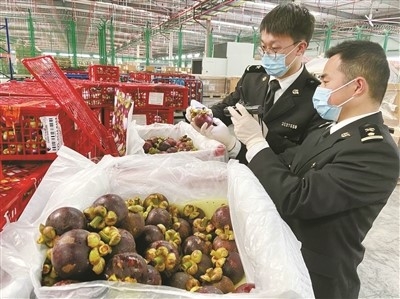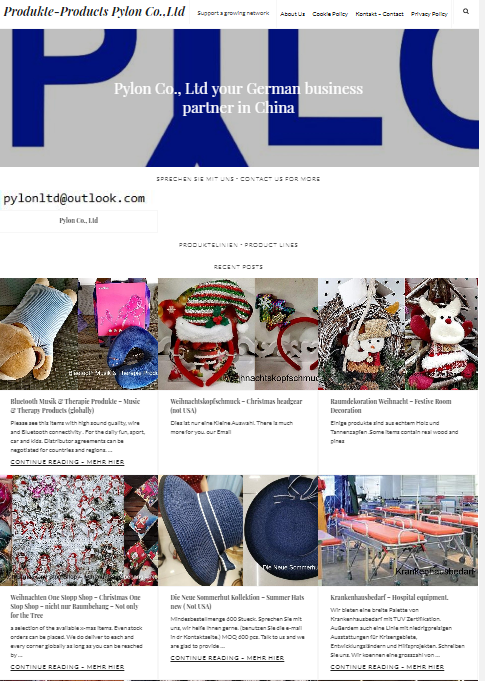Statistics of imported food in Ningbo released
- Details
- Category: Governmental News
- Published: Friday, 09 December 2022 13:46

With the reduction of taxes on consumer goods and the implementation of the RCEP agreement, Ningbo has witnessed a bigger variety of imported food, and some of the once novel food has become common. Which imported food has become the new force? What imported food possesses potential for popularity? Recently, Ningbo Customs has released the big data of imported food in the first ten months of this year.
Fruit is most popular
According to the statistics of Ningbo Customs, dry and fresh fruits and nuts top the list for imported food to Ningbo from January to October this year, with an import volume of 3.45 billion yuan, an increase of 124.7% compared with the same period of last year. The second goes to grain, with an import volume of 3.28 billion yuan, up by 14.5% year on year. Meat and meat chops rank third, with an import volume of 3.05 billion yuan, down by 0.3% year on year. The fourth goes to edible oil, with the import volume of 1.76 billion yuan, up by 18.9% year on year.
The fifth to tenth places are: liquor and beverages, with an import value of 1.53 billion yuan, down by 0.7% year on year; dairy products, with an import volume of 910 million yuan, down by 36.9% year on year; aquatic products, with an import volume of 890 million yuan, up by 154.7% year on year; instant noodles, with an import volume of 780 million yuan, up by 31.2% year on year; cassava starch, with an import volume of 280 million yuan, down by 8.4% year on year; and other non-cocoa sugar food, with an import volume of 270 million yuan, down by 25.6% year on year.
More Southeast Asian fruits are imported
Thanks to the favorable policies of the China-ASEAN Free Trade Agreement and the RCEP Agreement, fruit imports from Thailand, Malaysia and Vietnam can enjoy preferential tariff. Southeast Asian fruits such as durian, coconut and mangosteen have become more popular with citizens.
“You can now buy fresh imported coconuts and enjoy the Southeast Asian taste even in the winter.” said a staff member of Ningbo Customs, “Southeast Asia is rich in tropical fruits, which are highly complementary to the domestic fruit market, and the cost of transportation and other imports is relatively low. At the same time, fruit with the certificate of origin from ASEAN can enjoy zero import tariff, which has further opened the market for imported fruits.”
According to the statistics of Ningbo Customs, ASEAN is the largest source of dried and fresh fruits and nuts for Ningbo. From January to October this year, the import volume from ASEAN reached 2.26 billion yuan, accounting for 65.5% of the total fruit imports in the city. The main varieties are durian, banana, mangosteen and coconut. Among them, the import value of fresh coconut reached 200 million yuan, with a year-on-year growth of 80.2%; the import value of fresh durian reached 1.18 billion yuan, a significant increase of five times over the same period of last year.
Import of beef increases dramatically
With the change of the dietary structure of citizens and the differentiation of the meat market, beef imports have surged this year, and the consumption demand for beef has increased significantly. More and more beef from Brazil, the United States, Argentina, Australia and other countries have been imported and put onto the dining tables of households.
According to the data from Ningbo Customs, from January to October this year, the import value of beef and beef offal in Ningbo reached 2.22 billion yuan, a year-on-year increase of 1.8 times, accounting for 72.8% of the total imported meat in the city. The second goes to pork products, with an import value of 540 million yuan.
In addition, with the promotion of the China-CEEC Economic and Trade Cooperation Demonstration Zone and the China-CEEC Expos, Ningbo has become the first choice for China-CEEC cooperation, and the agricultural and food products from Central and Eastern European countries are constantly flowing into Ningbo’s consumer market.
According to the statistics of Ningbo Customs, from January to October, Ningbo imported 210 million yuan of food from Central and Eastern Europe, with a year-on-year growth of over 70%, which has not only brought more business opportunities to enterprises, but also provided consumers with more choices








